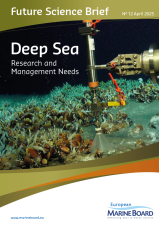
With 90% of all organisms in the deep sea still undescribed and many natural functions poorly understood, the deep sea faces significant threats from unsustainable resource exploitation and climate change. Europe has a pivotal role to play in leading international measures to protect and manage the deep sea requiring a robust scientific foundation and international cooperation. Science-policy interaction and transdisciplinary research are crucial in the protection and sustainable use of the deep sea.
The European Marine Board Future Science Brief No. 12 'Deep Sea Research and Management Needs' explores the complexity of the deep sea and its role in Ocean health today, highlights the critical ecosystem services and functions it provides, and underscores the risks to Ocean health in the face of climate change, direct human impacts, and future industries in the deep sea. The document also navigates the complex legal landscape and management issues, discusses the challenges of studying the deep sea, and identifies significant knowledge gaps in biological, biogeochemical, physical, and geological deep-sea sciences, and in the spatial and temporal variability of the deep sea.
You can find the news item about the document launch here, a factsheet summarizing the main recommendations here and more about the Working Group in charge of developing the document here.